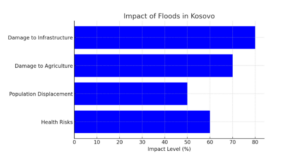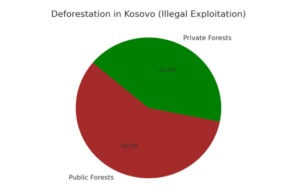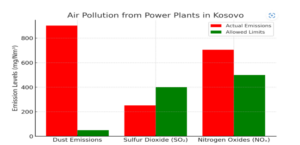Environmental Challenges in Kosovo[1]
Kosovo faces various environmental challenges that impact both the quality of life of its citizens and its ecosystems. Among these challenges, air pollution, deforestation, and waste management are the most pressing issues. Additionally, floods pose a continuous threat to the country.
Air Pollution
The main sources of air pollution in Kosovo are the “Kosovo A” and “Kosovo B” power plants, located in Obiliq. These power plants produce 97% of Kosovo’s electricity. However, their pollutant emissions significantly exceed European standards. In 2006, dust emissions from “Kosovo A” reached 902.32 mg/Nm³, while the allowed limit is 50 mg/Nm³. Additionally, sulfur dioxide (SO₂) and nitrogen oxide (NOₓ) emissions were 251.42 mg/Nm³ and 705.75 mg/Nm³, surpassing the allowed limits of 400 mg/Nm³ and 500 mg/Nm³, respectively.
Deforestation
Forests cover about 40% of Kosovo’s territory and play an important ecological and economic role. However, around 40% of public forests and 29% of private forests are subject to illegal exploitation. In 2008, in the Sharr region, approximately 1,800 m³ of wood was illegally cut, causing financial damages of around half a million euros. Furthermore, forest fires are a continuous threat, especially during the summer. In 2007, about 5,000 hectares of land were affected by fires, endangering biodiversity and causing soil erosion.
Waste Management
Waste management remains a significant challenge in Kosovo. The lack of adequate infrastructure for waste collection and treatment has led to the creation of illegal landfills, polluting the soil and water. Moreover, the lack of effective recycling programs and public awareness exacerbates this problem, negatively affecting public health and the environment.
Floods in Kosovo
Floods are a recurring natural phenomenon in Kosovo, causing material damage and endangering lives. The main factors contributing to floods are climate change, deforestation, and poor water management. Climate change has led to more intense and unpredictable rainfall, increasing the risk of floods. Deforestation, caused by illegal logging and fires, has reduced the land’s ability to absorb water, leading to faster surface water runoff. Additionally, uncontrolled urbanization and the lack of proper drainage infrastructure have contributed to the increased frequency and intensity of floods.
Consequences of Floods
Floods have caused significant damage to infrastructure, agriculture, and private properties. Flooding of agricultural land has resulted in decreased agricultural production, negatively affecting the rural economy. Besides material damage, floods have also led to population displacement and increased the risk of waterborne diseases.
Measures for Flood Prevention and Management
- Improvement of Drainage Infrastructure:
- Construction and maintenance of drainage channels to control water flow;
- Development of flood protection systems in high-risk areas.
- Forest Restoration and Land Protection:
- Implementation of afforestation programs to improve the land’s ability to absorb water;
- Prevention of illegal logging and sustainable forest resource management.
- Development of Early Warning Systems:
- Installation of monitoring stations for rainfall and water levels;
- Issuing early warnings to at-risk communities.
- Improvement of Urban and Rural Planning:
- Development of suitable infrastructure to reduce flood impacts;
- Creation of green spaces and protected zones to reduce water accumulation.
- Public Awareness and Education:
- Awareness campaigns on flood risks and protective measures;
- Training for local communities on how to respond during floods.
- Coordination with Institutions and International Organizations:
- Cooperation with local and international institutions for natural disaster management;
- Securing funding and technology for more effective flood control measures.



Graphs produced by the author
[1] This designation is without prejudice to positions on status, and is in line with UNSCR 1244/1999 and the ICJ Opinion on the Kosovo declaration of independence.








